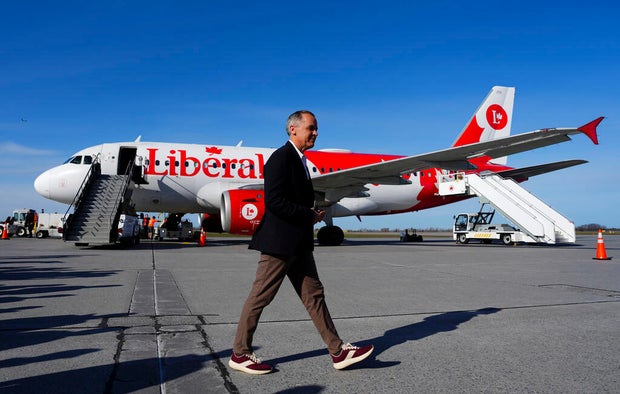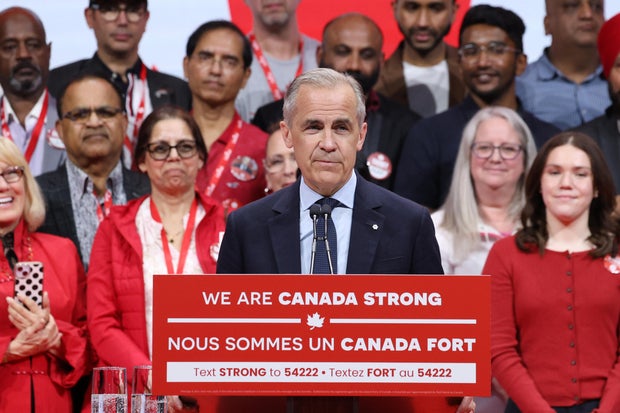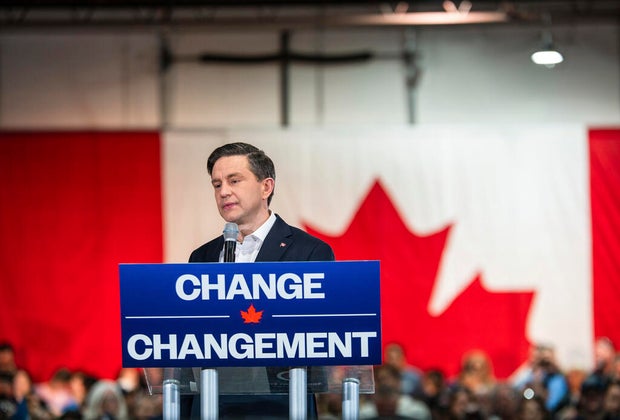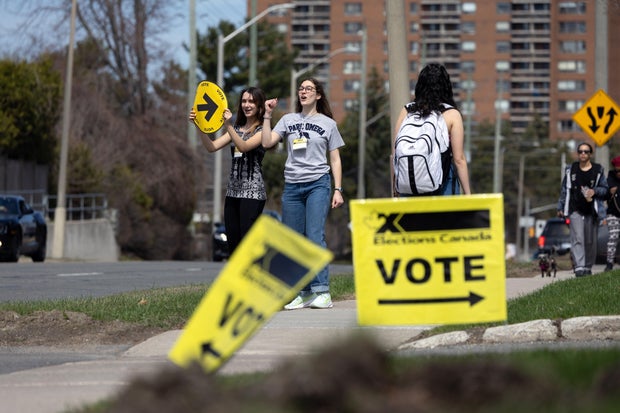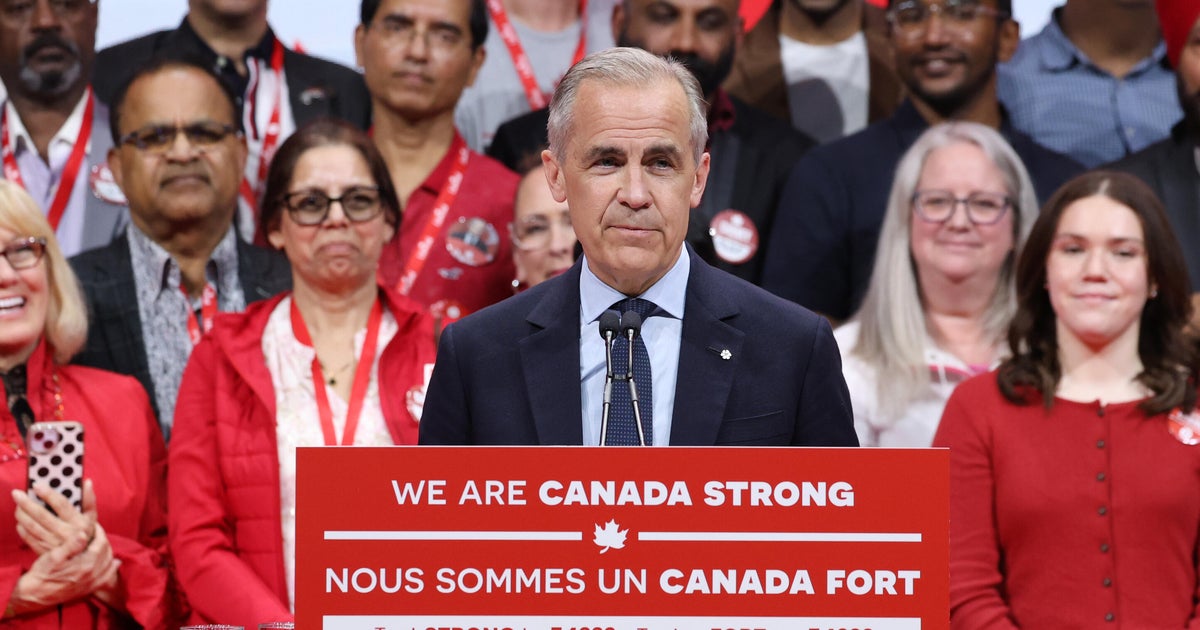
Canada’s Liberal Party won Monday’s federal election, marking a sharp political turnaround seemingly powered largely by the territorial threats and tariff tactics of President Trump.
Prime Minister Mark Carney‘s Liberals were projected to win more of the Canadian Parliament’s 343 seats than the rival Conservatives. It wasn’t immediately clear if the Liberals would claim an outright majority of at least 172 seats, or if they’d be forced to rely on lawmakers from a smaller party or parties to get new legislation passed.
Canadians decided with Monday’s vote to grant the Liberal Party a fourth term in power, now with Carney at the helm, rather than to transfer control to the Conservatives and their populist leader Pierre Poilievre, who only months earlier had been projected to win the election decisively.
Sean Kilpatrick/The Canadian Press via AP
The Liberal Party’s popularity had been declining for years, eventually leading to former Prime Minister Justin Trudeau’s resignation in March, and the Conservatives appeared poised to take control of the federal government — until Mr. Trump stepped in.
The American president’s repeated threats to annex Canada and his sweeping tariffs, which have undermined Canada’s economy, dominated the campaign and influenced voters’ choices. Domestic issues including affordability, immigration, jobs and crime remained significant factors.
“As I have been warning for months, America wants our land, our resources, our water, our country. Never,” declared Carney in a victory speech on Monday evening. “These are not idle threats. President Trump is trying to break us so that America can own us. That will never ever happen.”
Calling it a “hinge moment” in history, Carney said Canada’s “old relationship with the United States — a relationship based on steadily increasing integration — is over. The system of open global trade, anchored by the United States, a system that Canada has relied on since the Second World War, a system that, while not perfect, has helped deliver prosperity for our country for decades, is over. These are tragedies, but it’s also our new reality… We are over the shock of the American betrayal, but we should never forget the lessons. We have to look out for ourselves and, above all, we have to take care of each other.”
David Kawai/Bloomberg/Getty
Poilievre, a seasoned politician for the Conservatives, lost his parliamentary seat in Ottawa, casting doubt on his continued leadership of the party. Monday’s election marked a significant turn of events for the leader, who was first elected to the parliament in 2004.
Despite the blow, Poilievre vowed to remain in his position as party leader, and he pledged in a speech Monday night to keep fighting for change.
“Every single day, our conservative caucus and I will be holding the government to account on behalf of millions of Canadians who believed in the message of change,” Poilievre told his party’s supporters.
According to Elections Canada, a record number of Canadians — an estimated 7.3 million — cast their votes in advance, a 25% increase compared to the 2021 elections.
A diverse group of voters gathered Monday inside a school gym in Milton City, Ontario, to cast their ballots. While they were divided on who would be best to deal with Mr. Trump, they all agreed that Canada’s sovereignty, tariffs and the affordability of everyday goods were the main issues on their minds as they cast their votes.
“Trump’s decisions are affecting not just Canada but the rest of the world,” a couple who voted for the Liberals told CBS News outside a polling station. “The tariffs affected the market; it affected prices of all goods, food, anything.”
Laura Proctor/The Canadian Press via AP
Opponents cast the Conservatives’ leader Poilievre as having similarities with Mr. Trump, which may have ended up costing him on election day.
“A couple of things that, unfortunately, Pierre has come out with which we didn’t agree with,” the couple in Milton City, who wished to remain anonymous, told CBS News. “Might sound silly, but the fact he wants to bring back plastic bags and straws — I didn’t like that idea.”
One voter named Peter said he considered the issue of Canadian sovereignty while casting his vote. Although he did not specify which party he believed could best address concerns over Mr. Trump’s threats to make Canada a “51st state,” he stressed the need for Canadian unity.
John Ivsky, a self-employed businessman from Milton, said he considered the election crucial, emphasizing the issue of tariffs. He said Canada should seek more and different global partners.
David Kawai/Bloomberg via Getty Images
“Canada needs to build its own economy and broader partnerships,” Ivsky told CBS News. “America shouldn’t be the only economic, military, or political partner. We need partners all over the world, so we don’t suffer from one political change in one country.”
“I respect and vote for every party that can support family values, conservative values, freedom of speech, and I vote for the one that can reflect my beliefs, whether that’s Liberal or Conservative,” said Ivsky. “At this point, Conservatives are the ones that can do that.”
On Monday, Mr. Trump once again injected himself into the election campaign. In a post on Truth Social, he repeated his idea of making Canada the 51st U.S. state and called on Canadian voters to vote for the person who could make that possible — without naming either political party.
“Good luck to the Great people of Canada. Elect the man who has the strength and wisdom to cut your taxes in half, increase your military power, for free, to the highest level in the World, have your Car, Steel, Aluminum, Lumber, Energy, and all other businesses, QUADRUPLE in size, WITH ZERO TARIFFS OR TAXES, if Canada becomes the cherished 51st State of the United States of America,” Mr. Trump said on Truth Social.
In response to his remarks, Poilievre said Canada would never become the 51st state, and he urged the American president to stay out of Canadian elections.
“President Trump, stay out of our election. The only people who will decide the future of Canada are Canadians at the ballot box,” Poilievre said in French in a social media post. “Canada will always be proud, sovereign and independent and we will NEVER be the 51st State. Today Canadians can vote for change so we can strengthen our country, stand on our own two feet and stand up to America from a position of strength.”
In his campaign, Carney pleaded with voters to deliver him a strong mandate to deal with Mr. Trump.
“President Trump has some obsessive ideas, and that is one,” Carney said of the annexation threats. “It’s not a joke. It’s his very strong desire to make this happen. It’s one of the reasons why this crisis is so serious.”
